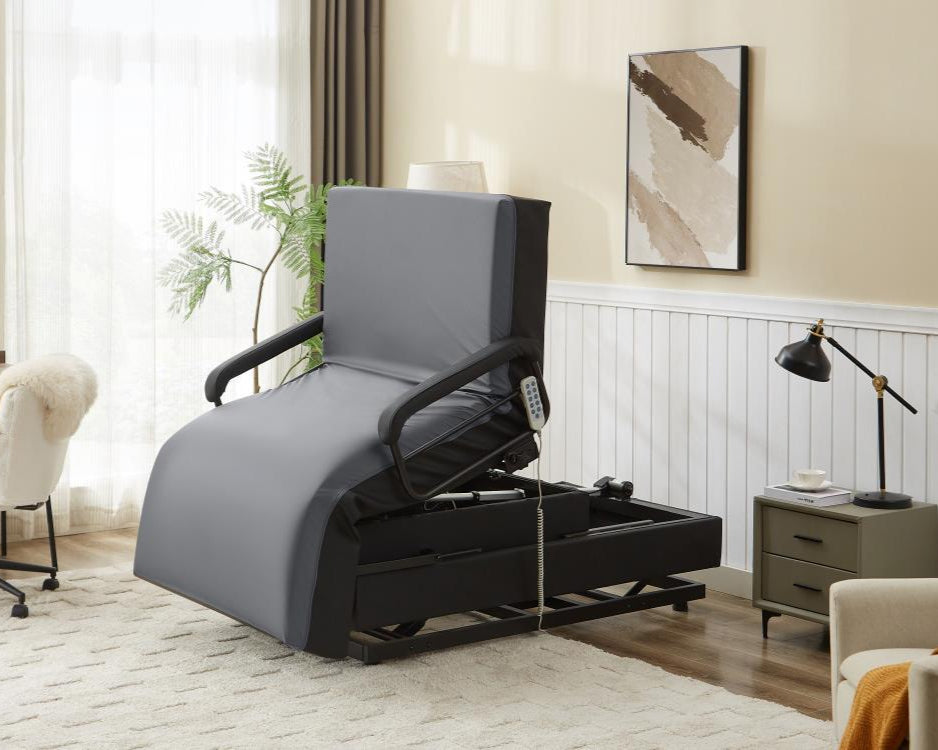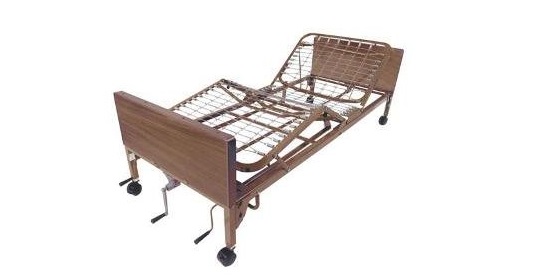Getting My Hospital Beds For Home Use To Work
Some Known Questions About Hospital Beds For Home Use.
Table of ContentsThe Best Strategy To Use For Hospital Beds For Home UseAn Unbiased View of Hospital Beds For Home UseThe Ultimate Guide To Hospital Beds For Home UseHospital Beds For Home Use Fundamentals ExplainedSome Known Details About Hospital Beds For Home Use 6 Easy Facts About Hospital Beds For Home Use DescribedNot known Facts About Hospital Beds For Home Use
There are three major kinds of healthcare facility beds: manual, semi-electric, and fully-electric. These beds make use of hand cranks to adjust the bed's height and increase and decrease the head and the foot.
Semi-electric beds have an electrical motor to increase and reduce the head and foot parts of the bed (hospital beds for home use). Full-electric beds have an electric motor that can elevate the head and foot sections of the bed as well as the whole height and positioning of the bed.
The Buzz on Hospital Beds For Home Use
Some versions can also relocate right into more placements, such as the Trendelenburg (tilt) setting. There are numerous kinds of health center beds, each developed to meet specific person needs. Below are some common types: This is one of the most common sort of medical facility bed, designed for general medical usage. It has a guidebook or electrically adjustable headrest, footrest, and height.
Reduced to the ground than a typical bed. This type of bed is developed for bigger individuals, with a bigger structure and higher weight capability than a standard bed. This type of bed is created specifically for kids, with smaller sizes than a typical bed. Special features such as full length side rails and animation style.
This type of bed is created for critically unwell clients who require open tracking and specialized clinical tools such as ventilators and infusion pumps. This kind of bed is developed for usage during labor and distribution, with flexible positions and functions to support the mother and baby throughout the birth procedure.
The Buzz on Hospital Beds For Home Use
Several function and the accessories do increasing grip to various parts of the vertebra and the extremities without relocating the body. These are simply a couple of examples of the kinds of hospital beds offered. The certain type of bed used will rely on the individual's condition, medical needs, and other elements.
Here is things you need to know. A one-function medical facility bed is a medical bed that allows a client to relocate only the head or foot area up or down. A 2 function healthcare facility bed commonly refers to a kind of medical bed that has two adjustable features to aid individuals in hospitals or treatment facilities.

The Basic Principles Of Hospital Beds For Home Use
A 7-function ICU bed is a sort of clinical bed that provides numerous flexible functions to sustain seriously ill people in a critical care unit (ICU) (hospital beds for home use). The 7 features usually include: Back-rest modification: blog here The backrest can be adjusted to different angles to assist the client sit up or lie down easily
Height modification: The bed can be elevated or lowered to make it simpler for people to get in and out of bed, and for caretakers to give care. Trendelenburg position: The whole bed can be tilted to advertise blood flow and blood circulation in the body. Reverse Trendelenburg placement: The bed can likewise be slanted in the contrary instructions to advertise blood circulation and flow in the top body.
While more budget friendly than electrical designs, these beds need physical initiative for modifications. The primary advantages of hand-operated beds are their price and integrity, as they don't depend on power. The requirement for manual initiative can be her latest blog a limitation in scenarios where quick adjustments are essential or where caregivers encounter physical challenges.
How Hospital Beds For Home Use can Save You Time, Stress, and Money.
Semi-electric health center beds provide a balance of handbook and electric controls. These beds provide an excellent middle ground between manual and fully electric options, offering ease of use without the full expense of electric designs.
Semi-electric beds are appropriate for clients that require modest modifications to the head and foot sections however can manage without regular height adjustments. This makes them a cost-effective solution for those looking for comfort and convenience without the need for consistent repositioning. Totally electrical health center beds feature electric controls for smooth adjustments to the elevation, head, and foot areas.
Specialty health center beds, such as ICU beds, long-term treatment beds, and bariatric beds, are meticulously made to attend to certain clinical demands. These beds use tailored take care of varied individual groups, boosting both results and comfort. In the adhering to areas, we will explore the main sorts of specialty hospital beds, outlining their details benefits and applications.
With years of experience in making electrical linear actuators - hospital beds for home use and close cooperation with the healthcare sector, TiMOTION is well-positioned to supply trusted health care services. Our vertically incorporated company takes care of every action of the production process, from style to actuator setting up, guaranteeing we provide remarkable worth and tailored options my response customized to your particular demands
Getting The Hospital Beds For Home Use To Work

To read more concerning incorporating these technologies into your items, call us today. Further reading:.
Data is sourced from the Medicare Price Record. Accessed January 2025. Short-term severe care hospitals have the greatest ordinary number of beds at 187. They are one of the most typical sort of healthcare facility in the U.S. and compose more than 50% of U.S. healthcare facilities. Kid's hospitals have 178 beds typically and VA health centers average 175 beds.

5 Easy Facts About Hospital Beds For Home Use Described
A hospital bed is a bed developed specifically for medical objectives. It is not just a location for people to relax, yet likewise a system for medical procedures. Unlike average home beds, hospital beds generally have flexible functions, which can help with clinical personnel to make different adjustments according to the demands of clients, such as transforming the elevation, inclination, and assistance angle of the back and legs of the bed.